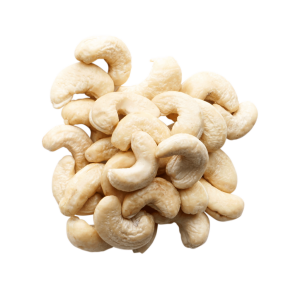BACKGROUND: Cashews, as the main source of monounsaturated (MUFAs) and polyunsaturated (PUFAs) fatty acids, are associated with reduced risk of cardiovascular diseases. Despite evidence for beneficial effects of nuts on lipid profile and glycemic control, to the authors’ best knowledge, little is known about cashews. METHODS: An eight-week, randomized, isocaloric, controlled-feeding study was conducted on 50 patients with type 2 diabetes mellitus (T2DM) randomly assigned to either the control or intervention group (10% of total calorie from cashews). Weight, fasting plasma glucose (FPG), serum insulin concentration and sensitivity, lipid profile ratio, high-sensitive C-reactive protein (hs-CRP), total antioxidant capacity (TAC), and paraoxonase-1 (PON-1) were measured at baseline and after eight weeks of intervention adjusted for age, gender, baseline values of FPG, insulin, HOMA-IR (homeostatic model assessment of insulin resistance), fiber, and both baseline and post-intervention vitamin C levels as covariates. RESULTS: Weight, body mass index (BMI), and waist circumference (WC) were not significantly different in the groups after eight weeks of intervention, as well as between the two groups, compared with the baseline measures. At the end of the study, serum insulin and low-density lipoprotein-cholesterol-to-high-density lipoprotein-cholesterol (LDL-C/HDL-C) ratio significantly decreased in the cashews group compared with those of the controls (P = 0.01 and P = 0.04, respectively). Although, HOMA-IR decreased significantly in the cashews group (P = 0.03), changes were not significant compared with the baseline measures (P = 0.056). Despite more increase in PON-1 activity in the cashews group, the changes were not statistically significant. CONCLUSIONS: Daily consumption of cashews reduced serum insulin and LDL-C/HDL-C ratio in patients with T2DM. However, further studies with larger sample sizes and more duration are needed to confirm the current study results.
